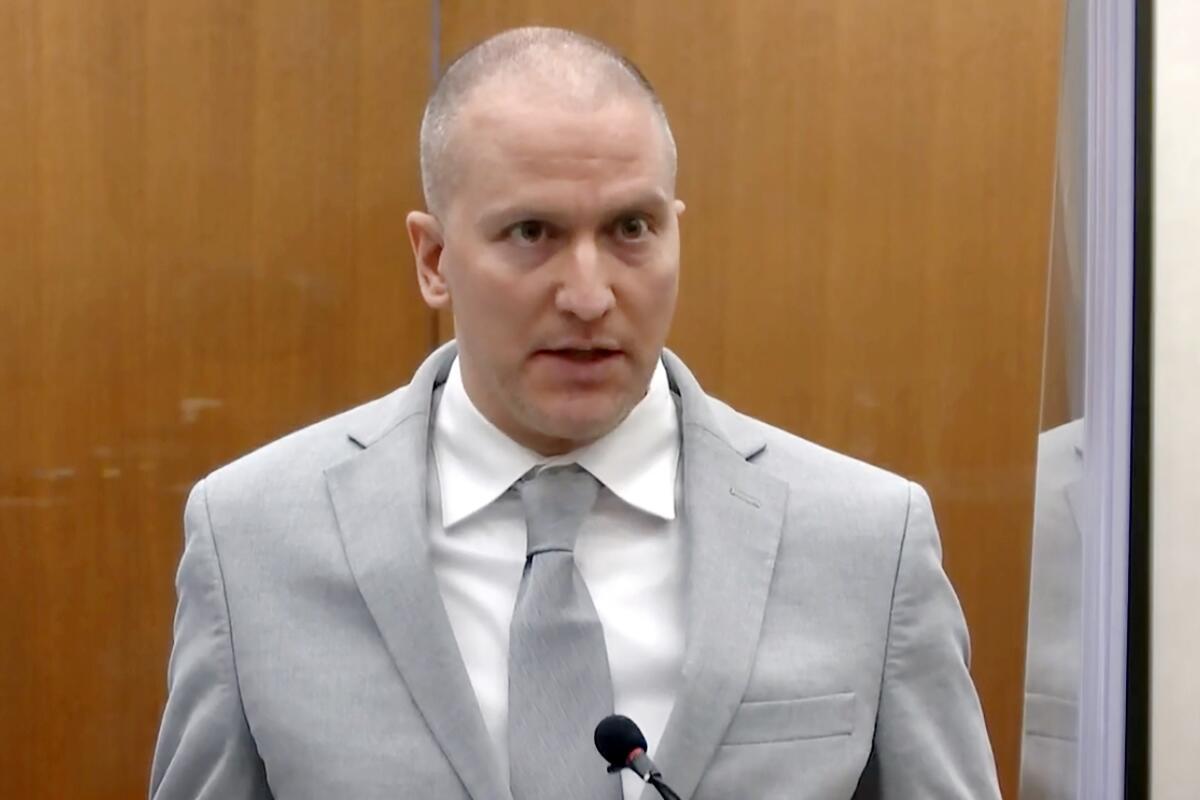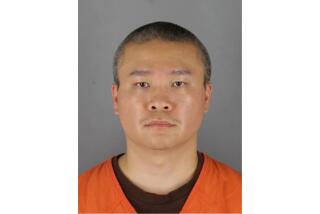Court is asked to void verdict against ex-policeman in George Floyd’s murder

- Share via
ST. PAUL, Minn. — An attorney for Derek Chauvin asked an appeals court Wednesday to throw out the former Minneapolis police officer’s convictions in the murder of George Floyd, arguing that legal and procedural errors had deprived Chauvin of a fair trial.
Floyd died on May 25, 2020, when Chauvin, who is white, pinned the Black man to the ground by kneeling on his neck for 9½ minutes. A bystander video captured Floyd’s fading cries of “I can’t breathe.” His killing touched off protests around the world and forced a national reckoning over police brutality and racism.
William Mohrman, Chauvin’s attorney, told a three-judge panel of the Minnesota Court of Appeals that the trial judge should have moved the case out of Minneapolis because of extensive pretrial publicity and unprecedented security precautions over fears of protests.
“The primary issue on this appeal is whether a criminal defendant can get a fair trial consistent with constitutional requirements in a courthouse surrounded by concrete block, barbed wire, two armored personnel carriers, and a squad of National Guard troops, all of which or whom are there for one purpose: in the event that the jury acquits the defendant,” Mohrman said.
But Neal Katyal, a special attorney for the state, said that Chauvin had received “one of the most transparent and thorough trials in our nation’s history” and that his “many arguments before this court do not come close to justifying reversal.”
Hennepin County Judge Peter Cahill sentenced the former officer in 2021 to 22½ years in prison after jurors found him guilty of second-degree murder, third-degree murder and second-degree manslaughter.
Chauvin later pleaded guilty to a separate federal civil rights charge and was sentenced to 21 years in federal prison, which is he is serving in Arizona concurrently with his state sentence.
“Judge Cahill managed this trial with enormous care, and even if Chauvin could identify some minor fault, any error is harmless,” Katyal said. “The evidence of Chauvin’s guilt was captured on video for the world to see.”
Minnesota Atty. Gen. Keith Ellison, who had assembled the prosecution team, sat in the front row for the oral arguments, which Chauvin did not attend.
Appeals Judge Peter Reyes said Wednesday that the court would rule within 90 days.
Even if Chauvin wins his appeal, his federal sentence will keep him in prison longer than his state sentence probably would because he would qualify for parole earlier in the state system.
Mike Brandt, a Minneapolis defense attorney who has been following the cases arising from Floyd’s murder, said that Chauvin winning the appeal “would be functionally meaningless” and that the former officer’s
time in prison is “pretty well locked in stone” given his federal sentence.
Mohrman often pursues conservative causes, including challenges to President Biden’s election victory and COVID-19 vaccination mandates.
He argued in his brief that the publicity before Chauvin’s trial was the most extensive in Minnesota history, and said the judge should have moved the trial and sequestered the jury.
Mohrman wrote that the publicity, the protests, the city’s $27-million settlement with Floyd’s family, the unrest over a police killing in a Minneapolis suburb and the sealing off of the courthouse were just some of the factors that undermined Chauvin’s chance of a fair trial.
Much of the questioning Wednesday centered on a juror who, a few months after Floyd’s death, had participated in a civil rights event to commemorate the Rev. Martin Luther King Jr.’s 1963 March on Washington.
Only after the trial did the juror reveal that he had taken part in the 2020 march, also in Washington.
The man was asked during jury selection whether he had participated in any demonstrations or marches in Minneapolis against police brutality after Floyd’s death.
But Chauvin’s original attorney, Eric Nelson, did not ask whether he had participated in any demonstrations elsewhere.
Mohrman argued that Cahill should have held a hearing after the revelation to determine whether the juror’s nondisclosure constituted misconduct. He said the appeals court should send the case back to Cahill for a hearing on that issue.
The appeals court’s Reyes said that judges have “fairly broad discretion” in conducting trials, and noted that Nelson had questioned the man and chose not to strike him from the jury. Reyes said case law puts the burden for asking prospective jurors the right questions on the defense.
Katyal told the judges that the juror had accurately answered the questions and had assured the court that he could render an impartial verdict. Katyal also noted that the defense didn’t use three of its peremptory strikes, an indication of its satisfaction with the jury.
In their brief, prosecutors said publicity had blanketed the state, making a change of venue for the trial pointless. They also said Cahill had taken sufficient steps to shield jurors from outside
influences, so there had been no need to sequester them before deliberations.
The appeal also questions whether it was legal to convict Chauvin of third-degree murder, and whether Cahill was justified in sentencing him to more than the 12½ years recommended by state guidelines.
More to Read
Sign up for Essential California
The most important California stories and recommendations in your inbox every morning.
You may occasionally receive promotional content from the Los Angeles Times.









